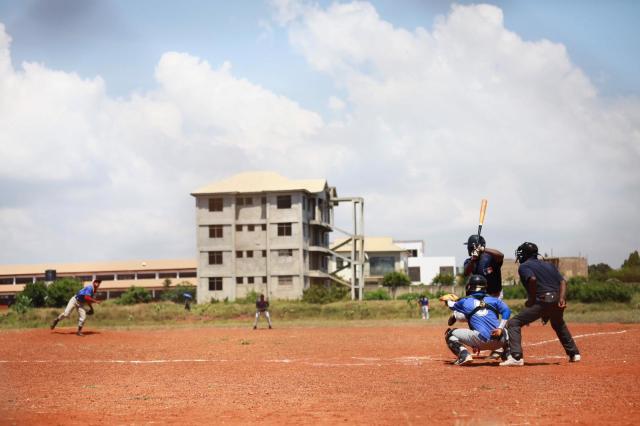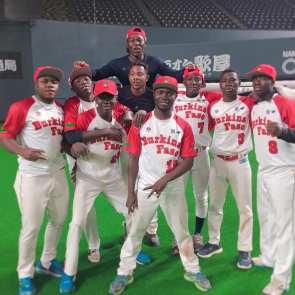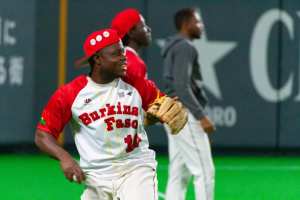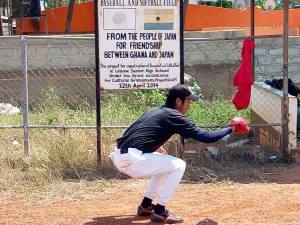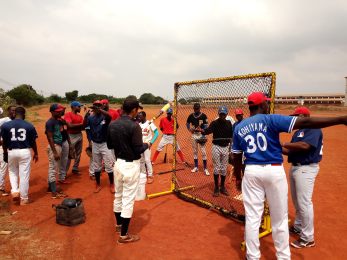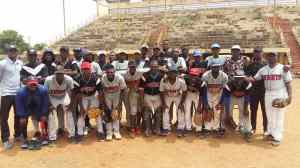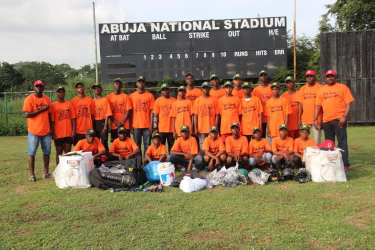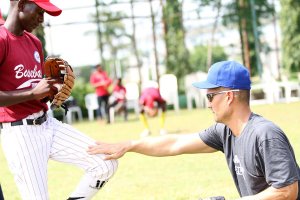The road to the 2020 Olympics for baseball begins tomorrow, March 22, in the most unlikely of places: Labone Secondary School in a suburb of Accra, Ghana. That any team other than South Africa is attempting qualification is a major feat in and of itself, as every African federation is beset by financial and equipment shortages. Unlike much of the world, travelling around Africa is very difficult due to both the sheer distance and the lack of connecting flights around the continent. Thus, no matter what happens in Accra this weekend, it is a major triumph for Africa and for the WBSC that the first of three qualifiers even occurred.
When we first broke news that there would be Olympic qualifying rounds in Africa [link], the WBSC had advertised two tournaments in the west of Africa. Ghana and Nigeria were selected as hosts, with the events scheduled for this weekend. It seemed unlikely that all the nations invited would field teams, as one country, the Democratic Republic of the Congo, was invited to Port Harcourt, Nigeria despite not even playing baseball. Another, Cameroon, did not appear to have an active federation, while two others, Ivory Coast and Tunisia, had never fielded a national team. The first two of these would withdraw by default, along with Togo shortly after.
In the end, the WBSC condensed these two qualifiers into a ‘Zone West Qualifier’ in Ghana, with five teams due to appear, representing Burkina Faso, Ghana, Ivory Coast, Nigeria, and Tunisia. With five teams due to appear in Zone West, the WBSC announced that two teams would qualify to the African Championship from May 1-5 in South Africa. The winner of that tournament will then head to the Europe-Africa Olympic Qualifier from Sept. 18-22 in Parma and Bologna, Italy [2019 International Baseball Calendar].
Alas, sources told us that Ivory Coast and Tunisia would withdraw from the western qualifier [tweet], with the former officially announcing its withdrawal on March 11 [tweet]. Since then, however, all three remaining federations have put out a significant amount of publicity on their training and travel, thus appearing to confirm that the tournament will go forward with a three-team bracket.
This tournament will be the first official baseball contested outside of South Africa since the 2008 Olympic qualifiers. Nigeria and Ghana participated in that event, while both qualified for the finals by defeating Burkina Faso (and Togo) in the West Africa qualifier. What follows is each country’s story since then.
Burkina Faso [Official Facebook]
In early March, the Burkina Faso team was spotted at the Kochi Fighting Dogs’ Stadium in Japan with its only professional, Sanfo Lassina. Lassina had brought the team to his stomping grounds for the day, while the trip to Japan for the eight players had been sponsored by the Japan International Cooperation Agency (JICA).
JICA has been instrumental in the growth of baseball in Africa, bankrolling not only the Burkina Faso team, but also Zimbabwe. That history goes back to 2013 and Lassina received his opportunity through a JICA tryout. When we spoke to the affable and authentic Fighting Dogs’ outfielder about baseball in Burkina Faso, he spoke glowingly of JICA’s representative in the country, Yuta Deai.
“Mr. Deai is the first baseball volunteer in Burkina; he was sent by JICA. It was with him that I started baseball in 2008…when I was 11 years old. Mr. Deai lived right next to my home. Let’s say I was attracted to Mr. Deai’s kindness and nobility” [translated from French].
Deai has made establishing baseball in the landlocked West African country his life’s mission. In 2013, he gathered 100 Burkinabé players for a tryout, with Lassina among that number. Only 15 at the time, Lassina made the cut and was invited by the Fighting Dogs to Japan. Lassina spent a month as an “intern” that year, returning for another month in 2015, after which he signed a contract with the team, a member of the independent Shikoku Island League Plus.
“Starting with my recruitment in Kochi, collaboration with fighters, the coming and going of Burkinabé players in Japan, the baseball materials it is [Deai] who does it alone,” concluded Lassina. “He continues to help us develop baseball in Burkina Faso.”
Although Deai has not discovered another player of Lassina’ calibre, he has continued to send teams to Japan, including in 2016 and the February trip this year. The earlier group included two players from Ghana alongside eight from Burkina Faso. One of the Burkinabé players was Hamidou Kafando. I asked Kafando what role Lassina and Deai had on baseball in his country.
“With [Lassina], we [could] understand what a professional’s best pace of games is. [But] in the end, there was a volunteer who never gives up and understands why we are aiming for the Olympic Games today. We expect a high level match and we feel ready to defend our heritage in good faith.”
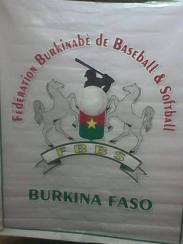 Burkina Faso has participated in only one baseball tournament in its history, the 2007 West African qualifier for the All-African Games. At the event, they lost to Nigeria and Ghana, beating Togo and failing to move on to South Africa. It would appear that, despite its contraction to three nations, the 2019 West Zone Qualifier will still send two club to South Africa. A single win, therefore, could be enough, but with Lassina confirming his participation to us, Burkina Faso (2-3 all-time) will set its sights on a pair of victories.
Burkina Faso has participated in only one baseball tournament in its history, the 2007 West African qualifier for the All-African Games. At the event, they lost to Nigeria and Ghana, beating Togo and failing to move on to South Africa. It would appear that, despite its contraction to three nations, the 2019 West Zone Qualifier will still send two club to South Africa. A single win, therefore, could be enough, but with Lassina confirming his participation to us, Burkina Faso (2-3 all-time) will set its sights on a pair of victories.
Ghana [Official Facebook]
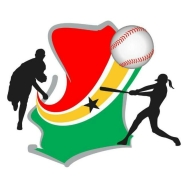 Ghana has been one of the most active African federations, participating in three previous tournaments, plus various friendlies, mostly against Nigeria. It has compiled an 14-11 overall record against other national teams since its first international games in 1993.
Ghana has been one of the most active African federations, participating in three previous tournaments, plus various friendlies, mostly against Nigeria. It has compiled an 14-11 overall record against other national teams since its first international games in 1993.
The U.S. Embassy had a pivotal role in the establishment of baseball and tee-ball in the early 1980s. There was even a national slowpitch softball team organised by the embassy in 1992. It was in the same year that Albert Frimpong and Joe Kwarteng founded Ghana Baseball and Softball Federation (GHABSA).
Much the same as with other African nations, however, JICA volunteers fostered the game in more recent years, with Frimpong continuing to lead. Its first baseball volunteer, Shinya Tomonari, came in 1998 and JICA has continued to send coaches ever since. In 1998, Frimpong, the national team’s centerfielder and captain, was sent to Japan with two other players to train with NPB legend Yoshihiko Takahashi. Takahashi also put on clinics in Ghana.
Ghana qualified for the 1999 All-Africa Games by beating Nigeria 11-10 in a single-game West African qualifier, splitting four games in South Africa afterward. It qualified once more in 2007, finishing second in the West Africa group before going 3-2 in South Africa. Its loss to South Africa in each tournament was substantial (11-1 in 1999 and 15-0 in 2007).
Between 2011-16, Ghana sent players to the MLB Elite Academy before the programme was discontinued. In 2014, the Embassy of Ghana funded construction of a baseball field in Labone, a suburb of the capital, Accra. Koshien Field, named after the famous Japanese high school championship and its stadium, cost $123,453 and was paid for fully by the embassy [link]. Two years later, a pair of players were sent to Japan by Deai and it appears that the team even scrimmaged an alumni squad of the Nippon Ham Fighters.
We recently spoke to Ernest Danso, GHABSA Executive Director, who told us, “Currently the national team is preparing for the qualifiers. Developing baseball in Africa has always been a challenge, but as a federation we are adapting strategies that will help us defeat that.”
Frimpong elaborated on the challenges in a conversation we had with him in 2017: “Every single [piece of] equipment we have here in Ghana we got from Japan. The Japanese under Mr Shinya Tomonari, who was our Team manager, made all that happen since 1996.”
As we have reported elsewhere, equipment must not only be donated, but clear customs. A recent donation from the U.S. has sat in limbo for two years in Zimbabwe.
“After leaving Ghana, [Tomonari] formed the Association for Friends of African Baseball (AFAB) and with that he has continued to help Ghana and a few years ago helped start baseball in Tanzania as well as other African countries. Each year we get used equipment donations from them in Japan, but it stopped coming two years ago because our government does not help clear them and it costs them too much to do that for us.”
Still, through the energetic efforts of Frimpong and others, baseball not only carries on, but was selected as one of four African qualifying round hosts. The federation has put out daily updates on training for several weeks now (available at the Facebook linked above), even publishing a regular countdown.
“Ghana was selected based on experience, expertise, availability of a playing field and our position in African baseball,” concluding GHABSA’s president. “Ghana is a founding member as well as pioneer of baseball and softball in Africa together with South Africa, Nigeria and Zimbabwe.”
Nigeria
Unquestionably the most successful African nation outside of South Africa, Nigeria brings a 22-5 record since 1999 into the Zone West Qualifier. Its first international appearance in 1999 featured Adeyinka Adewusi, a shortstop and pitcher who would go on to play nine seasons in South Africa, plus two in Sweden where he was one of the top players. Adewusi has since started the Angels Youth Baseball Factory (2011) and worked for MLB as a consultant and scout (2013-present).
Baseball first appeared in 1960 in Nigeria, introduced by U.S. Peace Corps volunteers, but was snuffed out by the 1966 Civil War. In 1989, the Nigerian Baseball and Softball Association (NBSA) was founded to breathe life into the sport again. Since then, it has sporadically held Under-12, U16, and senior team national tournaments, while hosting a variety of coaches from the U.S. and Japan for clinics since 1990.
Nigeria, incredibly, can boast a top-tier professional in the Tohoku Rakuten Golden Eagles’ Louis Okoye. Okoye is half-Nigerian, half-Japanese, though he speaks only Japanese after having been born and raised in Japan. The centerfielder visited Nigeria in 2016 and put on a clinic after having debuted in NPB as an 18-year old. Only 21, Okoye has a very high ceiling [link] and will miss the qualifiers due to the Golden Eagles’ spring training.
Nigerian baseball has recently been the beneficiary of two charities working with the sport. The Baseball Tomorrow Academy was founded in 2013 and started operations a year later. According to its website, “Our organisation uses Baseball and Softball combined education and personal development to realise the potentials of young people.” It has partnered with the U.S. Embassy to expand to primary and secondary schools in Nigeria.
In October 2017, the Baseball Tomorrow Academy and the U.S. Embassy organised a visit by long-time major leaguer Jeremy Guthrie. Guthrie put on clinics for 60 youth, who came from all around Nigeria [link]. Last year, Nigeria sent youth from the academy and senior players to the World Comes to Palm Beaches Tournament in Florida, where they participated on ‘Team Earth’ squads.
Another charity that has partnered directly with the Nigerian Federation is the Baseball Nigeria 2020 Project. Its director, David Robert Andrews, told us, “I was approached by the Nigerian Baseball & Softball Federation to help them qualify for the 2020 Olympic Games. It is a daunting task as there is so much work to be done but the support…is growing larger everyday.”
Meanwhile, Nigeria has been growing its Little League programme over the past few years. The nation has 17 chartered leagues, with a total of 60 teams across all divisions. The District Administrator, Kehinde Laniyan, elaborated for us, though his discussion of baseball in Nigeria from 2013 is well worth a read [link].
“Baseball is played in the following cities in Nigeria: Lagos, Ilorin (in Kwara State), Abuja, Port Harcourt, Ibadan, Ekiti, Akure, Aba, Yenegoa and Asaba. They play it more other cities but those mentioned before can produce teams easily when called upon for tournament. Ibadan, Lagos and Ilorin have highest number of players. Youngest players between the ages of nine and 16 can be found more in Ibadan and Ekiti because of the little league program.”
Laniyan also plays a role with the national team and filled us in on their preparations.
“We started camping of our players on March 4, 2019 at Adewole Baseball Park in Ilorin, Kwara State, about 500 km to Lagos. Adewole baseball park is the first baseball field in Nigeria, built in 1990. Forty players were called to camp selected from two most recent senior tournaments. The camp is a mix of old and young players, though.”
Nigeria is, as one might expect, feeling quite confident given that it has never failed to qualify for an African final. In fact, it won silver in 1999, 2003, and 2007, while winning the 2007 West Africa Qualifier as well. In the ultimate test of African baseball, it has kept things close against South Africa, losing 6-3 in 2003, though its two other meetings were blowouts.
“We will go and try our best,” Laniyan told us. “To be realistic, Ghana and Burkina Faso are catching on very fast on Nigeria. They have younger and trendy players. Nigeria will rely much on experience.”
Schedule is as follows:
22 March, 10 a.m.: Burkina Faso v Nigeria
23 March, 10 a.m.: Ghana v Burkina Faso
24 March, 10 a.m.: Ghana v Nigeria

